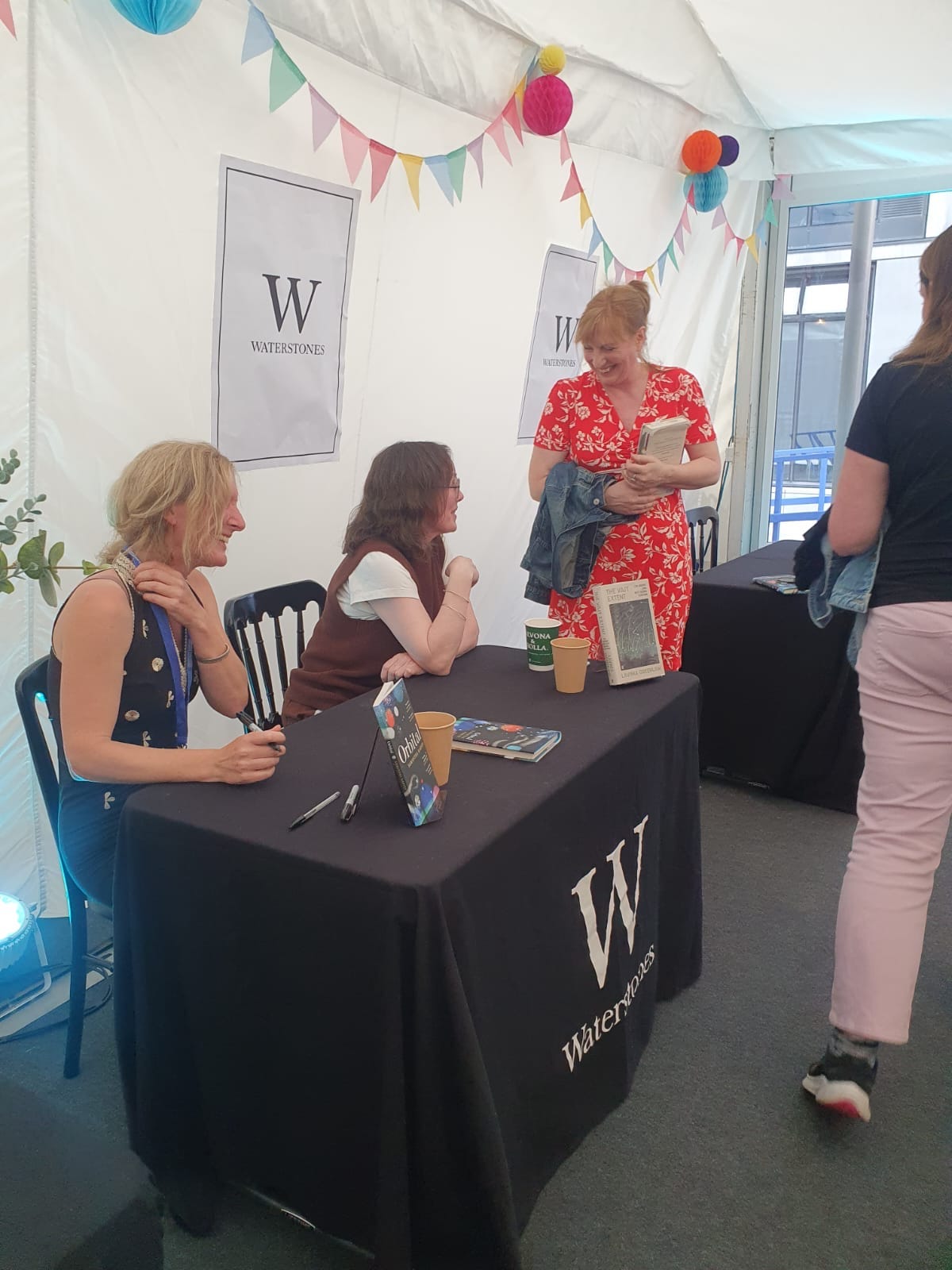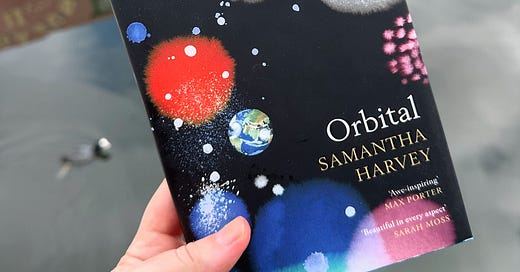ORBITAL by Samantha Harvey wins the Booker Prize.
Celebratory repost of my review and discussion with the author.
I called it! To celebrate the wonderful news of Orbital winning the Booker Prize I’m re-publishing this post without the paywall.
Orbital by Samantha Harvey has united critics over its beauty, its poignance, its meditative brilliance. Clearly deserving of its Booker shortlisting (and the win in my view), the more intriguing question is why it made the Orwell shortlist for best political writing. The almost universal adoration of this text suggests nothing controversial, conventionally political, or indeed anything to scare the horses at all.
Every period of political turmoil produces its own great works. Contemporary writers may like to believe we are writing beyond our immediate political context but we never are. Orbital is the work of fiction for our cultural moment, as en pointe as Animal Farm was to its time. But it is also political in the way women’s writing often is: subversive, side-on, appearing to conform whilst giving a devastating critique.
We live in The Age of Kindness where only those ‘others’ are ruining it. None of ‘us’ is tyrannical. It’s all ‘them’. Who is ‘them’? Anyone the good people disagree with. The Age of Kindness is a febrile mix of anarchy, narrow spiritualism and personal spite where a significant proportion of the western population seems to think our world’s greatest tyrant is a children’s author called JK Rowling. Our political moment is organised chaos, and Orbital is the masterwork of resistance it has produced

At the Edinburgh International Book Festival this year I was lucky enough to chair Samantha Harvey with Lavinia Greenlaw, (whose wonderful The Vast Extent is worthy of its own discussion). What’s starkly relevant in this context is that I was nearly not at the Book Festival at all. An attempt was made to de-platform me for my perceived ‘gender critical beliefs’: it’s only because the Book Festival did their best to resist that attempt that I got to interview Harvey at all.
So by a twist of fate, I, an author directly impacted by the MO of the times got to interview on stage an author whose novel exemplifies, and even transcends these times. My aim was not to foreground the political context that brought us together, but to be free, as authors, intellectuals, and women to discuss their works. This is rare indeed. When women are together in an event like this, the subject of being ‘women’ invariably gets the spotlight. Having a woman chair of women, can, if you’re not careful, downgrade the whole event in others’ eyes. Parachuted in, past the activists, I got to discuss these works and their ideas in front of an audience, who, unlike the those trying to manipulate them, were hungry for discussion and knowledge.
It was a quietly revolutionary moment in Book World. More revolutionary still would have been that I could chair the event I was originally asked to do as well. We are not quite there yet: book festivals are not yet a space for the free exchange of ideas. But I am hopeful for change. For more on that, watch this space.
The plot of Orbital is deceptively simple. Six astronauts are aboard the International Space station orbiting the earth. The book is structured around the orbits (sixteen sunrises, sixteen sunsets every day) and populated with the details of the astronauts’ contrastingly constrained lives where every minute is accounted for. Days are spent in exercise to try and prevent muscle and bone density loss; scientific experiments; maintenance of the craft or sleeping upside down in floating bags.
Orbital has been described as a meditation, a prayer, a hymn even but more than this it reads as propulsively as a thriller. It’s only short, arguably a novella, and the jeopardy is provided by glimpses of a typhoon sweeping across the planet. In a sense nothing happens, all is simply perception. But also everything possible happens in quick succession, giving rhythm to the text. This is a masterclass for the aspiring writer. See how structure produces momentum, a story. See how the scenes and dramas playing out, past and present, on earth amplify that sense of movement. Orbital is a supple, beautifully constructed work of art, all the more skilled for it seeming effortless.
From their place of plummeting stasis, the astronauts can do nothing but observe the 300 mile-wide typhoon circling towards the low-lying land masses of the Pacific. The text is interspersed with perspectives from earth: a fisherman in a direct path of the typhoon once met one of the astronauts when he was on a diving holiday. A friendship of strangers was born, and the fisherman knows he will likely receive a text from space warning him about the typhoon. The fisherman, however, in his cardboard house, is wiser than to run. He will simply rebuild. It is what his people do.
The mother of Chie, the Japanese astronaut, dies alone at home on earth during the mission. We glimpse Chie’s grief, but, strikingly, through the empathy of her colleague Anton. When, finally, she talks about her sadness, four tears float from his eyes and they reach out to catch them together. Moisture must not be allowed to linger in the craft. In space there is always a bigger concern.
Perspective as an engine of the plot is a dizzying triumph. Orbital is bookended by an image: Velázquez’s Las Meninas where the question of who is actually the subject of the image may even be its subject. Orbital asks: are we all simply elements of a great work of art? A brief discussion between the one Christian on board, Shaun, and his colleague Nell distils this question to a few letters on the end of a word. The description of the universe is exactly the same for believer and the non believer alike, simply one considers it ’heedful’ and one ‘heedless’. Harvey herself, a gently spoken, deeply thoughtful person discussed in our stage conversation how these religious questions are of great interest to her, and this was how she was able to centre them, without turning it into a ‘religious book’. The setting of space set her free from the zealotry of the Age of Kindness.
Animal Farm populated an allegorical world with representative characters from the totalitarian regime of Stalin, creating a fable that could talk about tyranny in a deceptively simple way. Orbital does something different. Harvey is directly within the political moment, unlike Orwell. In Animal Farm the politics are country-specific, in Orbital they are global. Harvey has produced in one sense a deracinated text: Orbital avoids all the political flashpoints of our time: identity, sex, religious conflict, climate change, matters that plague contemporary fiction and its authors. Indeed contemporary novels are routinely deracinated by clumsier hands than hers within publishing itself, and their authors similarly stripped of agency. In her world of eternal absence, Harvey can thereby interrogate these flashpoints, and in doing so she performs a profoundly political act.
‘Orbit 7’ is the chapter that redefines for the astronauts (and for the reader) the notion of politics itself. In perhaps one of the most beautiful and moving discourses on the nature of politics written in fiction, she moves from the sense the astronauts had of its irrelevance (a ‘pantomime’) to a realisation of its elemental force:
But then one day something shifts. One day they look at the earth and they see the truth. If only politics really were a pantomime, if politics were just a farcical, inane and at time insane entertainment … Instead they come to see that it’s not a pantomime, or it’s not just that. It’s a force so great that it has shaped every single thing on the surface of the earth that they had thought, from here, so human-proof…
We are God and not-god. We change everything and affect nothing. The world is what is it because of all of us, the ‘good people’ included. There is no ‘other’, no singular tyrant to blame, no easy bad guys to highlight our own purity. Whilst we stumble around in our hate-filled chaos looking for enemies to burn, we ignore far-away devastation, the human cost of our indifference to each other and most of all, the luminous spot in the darkness, that, Harvey’s characters muse, might actually be heaven itself.
What’s to be done? This question is what makes Orbital the political novel of our Age of Kindness. Our most revolutionary act, Harvey suggests, is simply to be there to feel – and catch -- the tears of our fellow human being, and in that tiny action save the whole world.
Thank you for supporting Monday Night Reads. For more great writing delivered straight to your inbox why not subscribe? Currently there is 10% off a year’s subscription.
You can buy Orbital by Samantha Harvey here.
Orbital by Samantha Harvey review:
Listen to this essay here:





What a fantastic review. This is absolutely next on my reading list (the fact I a space geek helps too)